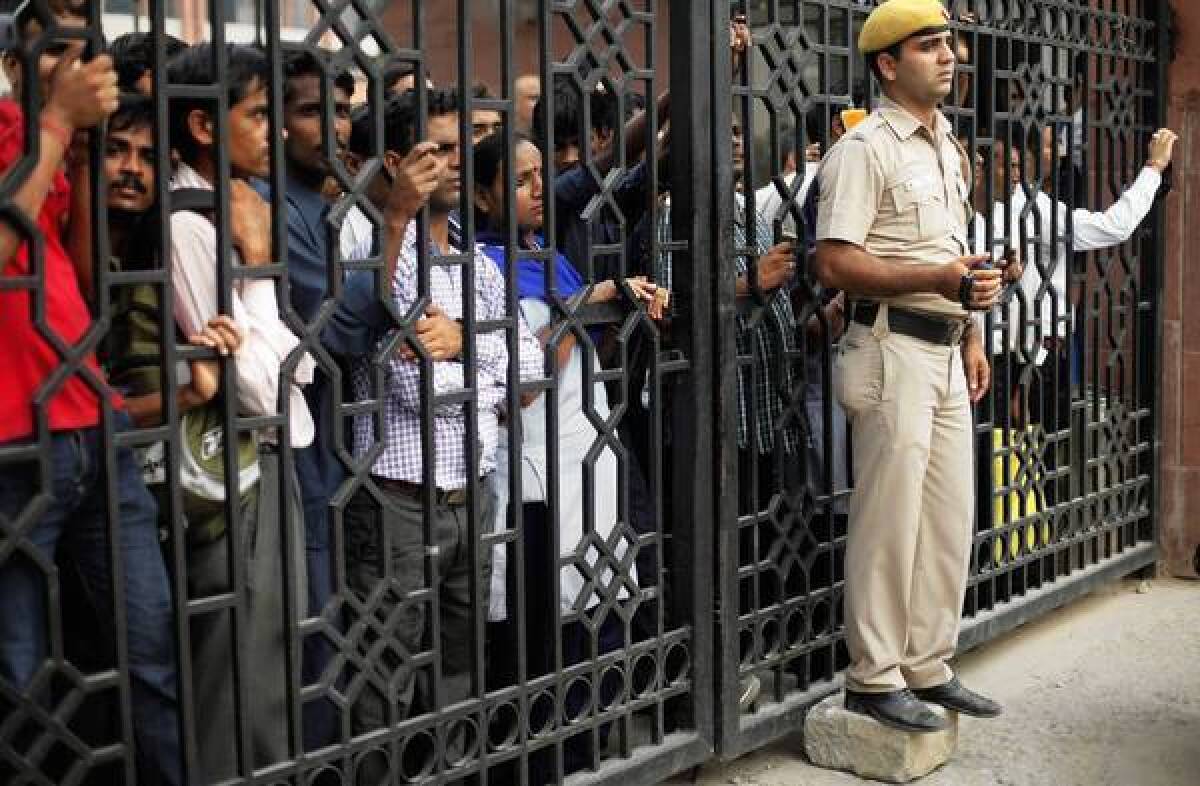4 in India bus rape sentenced to death

- Share via
NEW DELHI — An Indian court sentenced four men to death Friday in the December rape and murder of a 23-year-old physiotherapy student, one of most closely watched legal decisions in the country’s recent history.
Judge Yogesh Khanna announced the sentence in a one-paragraph order, in contrast to his 237-page verdict a few days ago. “In these times when crime against women is on the rise, courts cannot turn a blind eye,” he said.
The victim, who died of massive internal injuries two weeks after the assault on a moving bus, has not been named under Indian law. The four death row convicts, ages 19 to 35, were among six apprehended after an attack that struck a deep nerve in India. The fifth defendant reportedly committed suicide in prison, although his family says he was killed. The sixth, who was a juvenile at the time of the attack, was given three years in a rehabilitation facility, the maximum punishment, prompting some Indians to call for minors to be treated as adults in extreme cases.
The assault sparked violent demonstrations that jarred politicians and bureaucrats into action, leading to fast-track courts, amended police procedures and a new statute that imposes harsher penalties for gang rape and other sexual crimes. The law didn’t apply in this case because it was passed after the attack.
The Supreme Court has reserved the death penalty for the “rarest of rare” cases, and most are commuted to life imprisonment. Though 1,455 convicts received the death penalty from 2001 to 2011, only four executions have been carried out in the last 18 years.
But social anger this time has been intense. Outside the courtroom Friday, demonstrators called for the five convicts, including the juvenile, to be killed soon.
“Hang all rapists,” read a sign with a small, crooked face inside a noose. “Rape is not a child play, so no rapist can be a child,” read another.
Nearby, a house painter wore a shirt depicting what appeared to be a bloodied figure in white shorts, explaining to reporters that it was a Hindu god eating the souls of the convicted.
The four who were sentenced Friday — Akshay Thakur, unemployed; Vinay Sharma, a gym instructor; Pawan Gupta; a fruit seller; and Mukesh Singh, a driver — vowed to appeal.
Women’s rights activists are divided on whether capital punishment should apply in horrendous crimes such as this one, said Indu Agnihotri, director of New Delhi’s Center for Women’s Development Studies, a think tank. But most agree on the need for fair and speedy trials, she said, in a nation where justice is creaky and a woman’s life can be ruined by the stigma a rape case carries in India.
According to human rights watchdog Amnesty International, India is one of 58 nations that carry out death sentences, compared with about 140 countries that have abolished them in law or practice. India provides few details on its execution policy. In 2007, it reported having executed 52 people since 1947, although civic groups believe the figure is far higher.
Under current rules, laid out in news reports and a 325-page prison manual, hangmen must be adult males more than 5 feet 4 inches tall. Many prepare by using sandbags weighing 150% of the prisoner’s weight to preclude rope breakage. The rope’s length is inversely proportional to the subject’s weight — the heavier the subject, the shorter the rope — and the rope is treated by the hangman with butter, soap and sometimes banana skins to soften it.
One person who expressed pleasure with the judge’s decision Friday was Pawan Kumar, a 52-year-old textile shopkeeper who hopes to someday become a hangman.
“They deserve capital punishment, and I will be more than happy to do it,” the Uttar Pradesh state resident said. “The crime is unpardonable. My application to be hangman for Delhi jails is pending with the inspector general.”
Kumar said he hoped the judgment would be carried out. “If they gave them life, I’d blame the government for being lax and careless,” he said. “It would mean they don’t care about citizens’ lives.”
Tanvi Sharma in The Times’ New Delhi bureau contributed to this report.
More to Read
Sign up for Essential California
The most important California stories and recommendations in your inbox every morning.
You may occasionally receive promotional content from the Los Angeles Times.













